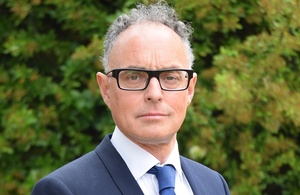Good afternoon and welcome back to Downing Street for the daily coronavirus briefing.
I am delighted to be joined by the Baroness Dido Harding, the executive chair of NHS test and trace. Before we turn to test and trace let’s go through the daily slides. If we have the first slide, please.
This slide shows testing and the number of new confirmed cases of coronavirus.
And the figures show that as of yesterday there were 197,007 tests, bringing the total number of tests that have been done in this country to more than 6,240,801.
And the number of confirmed cases as of yesterday was 1,266, bringing the total number of confirmed positive test results to 291,409.
And you can see that despite the vast increase in the number of tests that have been carried out, the number of positive cases continues to fall, and has been falling on that 7-day rolling average, a little bit up from the very low figure yesterday of 1,003, but nevertheless continuing overall to fall.
Next slide, please. This matches the data from hospitals, which shows that the number of new admissions with COVID-19, excluding Scotland, was 462 on the 8 June and this is down from 658 a week earlier on the first of June and down from a peak of over 3,000 in late March.
Likewise, the number of those people on ventilator beds, mechanical ventilators, is down to 440. Down from 604 a week ago, and again, that was over 3,000 at the peak so it’s very good progress to see both of those numbers continuing to fall over recent days.
If we turn now to the next slide, which shows the regional breakdown. Again, as it has throughout this crisis, this shows that the shape is broadly the same in most regions of the country and the downward trend persists everywhere, which is obviously very good news.
If we turn now to the number of deaths, the final slide. The latest figures show that yesterday 151 people died with coronavirus, that’s the reported number, bringing the total to 41,279.
Again, we can see this downward trend continues to come down and in fact the number of deaths over the past week is the lowest since the week ending on the 28 of March and this is good progress but clearly, clearly there is more to do.
And these data show that this virus is in retreat.
In summary, we’re working through our plan and the plan is working and that means we’re able to restore some of the freedoms that people hold so dear.
And from the beginning of lockdown the challenge has been not just how to get the virus under control but how then to be able to ease the lockdown measures.
I was really delighted by the announcement that the Prime Minister was able to make yesterday, allowing these bubbles so that single parents or those who live alone will be able to form a support bubble with one other household.
I think this is a big step forward. It’s very difficult to imagine the impact if you haven’t lived on your own for 12 weeks and so I’m really pleased that we’ve been able to restore that human contact and the support that so many have been missing.
And I know the Prime Minister’s announcement has given such hope and comfort to so many and I’m really pleased at the very positive reception that it’s got.
To help us take more measures to come out of lockdown of course, the Prime Minister tasked Dido and I with delivering a test and trace system.
Testing for the virus and tracing how it’s spread is critical to containing it locally so that we can ease the national lockdown.
And it’s by isolating the virus that we can control it and we can stop it spreading through our communities.
In this plan to lift lockdown test and trace is our radar if you like: it helps us identify where the virus is and trace how it’s spreading through the community.
And you have your part to play.
If you have symptoms, you must immediately self-isolate and get a test. It’s easy to get a test on NHS.UK or by dialling 119.
If you test positive you must work with NHS test and trace to identify who you’ve been in close contact with and if you are asked by NHS test and trace to isolate, you must do so to break the chain of transmission and to stop the spread of the virus.
I would even go so far as to say that participation with NHS test and trace is your civic duty.
Please, do it to protect your loved ones, do it to protect your community, do it to protect the nation, and do it to protect the NHS.
Today we’re able to publish some of the initial statistics about the first week of operation of NHS test and trace.
Baroness Harding will take as through these figures in a moment, but I just wanted to put them in a bit of context. They paint a positive picture as we will see when we go through the figures.
Firstly, remember that they represent just the first 7 days of this service and yet it’s already had a huge impact. The system is working well and as we both said at the start, we will keep improving it.
It will keep getting better and I think you’ll see from these figures why we are confident that it will be world class.
And I’m also delighted to say we still have spare capacity, and long may it remain so. This is a good thing. It’s a sign of the team’s success.
And I just want to take this moment before I hand over, on behalf of us all, to thank Dido and her team, to thank the army of contact tracers, thank you, to thank the NHS and Public Health England who are playing such an important role, to thank the private companies without whom this would be impossible, including Boots and Amazon and Serco and Sitel.
And finally, I want to thank you for your participation. It is brilliant that the vast majority of people have done their civic duty.
And as we work through our plan and as we keep driving this virus down let us maintain that spirit and fortitude that has helped us throughout this pandemic.
And that of course includes not attending large gatherings, including demonstrations, of more than 6 people.
Now, I understand that people want to show their passion for a cause they care deeply about but this is a virus that thrives on social contact, regardless of what your cause may be.
So please, for the safety of your loved ones, stay alert, control the virus and save lives. I am now going to hand over to Baroness Harding to take us all through the test and trace statistics.


